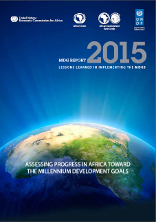MDG Report 2015 - Assessing Progress in Africa toward the Millennium Development Goals

One important lesson from the MDG experience is that initial conditions invariably influence the pace of progress on global development agendas. Given their relatively low scores on most MDG indicators in 1990, it is not surprising that Africa will not achieve all the MDGs by 2015. Nevertheless, several countries introduced successful institutional and policy reforms to improve governance, promote economic growth and enhance access to social services. As a result, the pace of progress on all indicators has accelerated since 2005.
In particular, African countries have made significant strides in enhancing women’s representation in national parliaments, reducing maternal, infant, and HIV-related deaths, and placing more children in primary schools. These achievements are a testament to the effort and commitment of the African people and their governments to meet the Goals.
However, several challenges remain: a high degree of inequity still characterizes access to social services including health and education; much remains to be done to achieve full and productive employment for all, particularly for women and youth; the threat of conflict and climate change looms large and could derail the progress made so far; and shocks such as the Ebola crisis have exposed the weakness of the health systems in some countries.
Sustaining the momentum and advancing the gains made under the MDGs will therefore require new approaches which embrace all three dimensions of sustainability – environmental, economic and social. In this context, African countries will need to adopt more inclusive growth strategies that create decent jobs for broad sections of society, promote equity and meet the development needs of present generations without compromising the ability of future generations to meet their own needs.
Africa’s regional strategy for sustained and inclusive development complemented by the global post 2015 development agenda provide an appropriate framework for sustainable development. Nevertheless, an important lesson of the MDGs is that success will hinge on a credible means of implementation. This report highlights successful policy interventions in Africa that should guide the implementation of the post 2015 development agenda going forward.